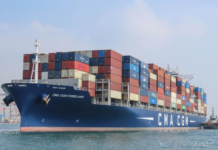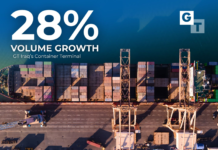
The Adani Group finds itself in a fix due to an escalation of protests against its under-construction container transshipment hub project at Vizhinjam, a green-field site about 10 miles southwest of Trivandrum in southern India.
The long-running unrest tied to resentments among “project-affected people,” mostly from the local fishing community, took a violent turn earlier this week, casting a shadow over Adani’s efforts to resume work at the site, which has been at a standstill for weeks.
The flare-up comes as the group was steering construction to open the project’s first phase by the middle of next year.
In addition to contractual timeline implications, the stoppage is costing the company heavily.
The port concession was awarded to Adani Ports (APSEZ) in August 2015, originally involving a total investment of some Rs. 7,525 crore (US$925 million) in two stages. Plans for Phase I called for a quay length of 800 metres, a large container yard, and sophisticated harbour equipment, able to handle 1 million TEUs annually.
Vizhinjam is being positioned as a viable counter to Sri Lanka’s Colombo port, about 175 nautical miles away, which commands the bulk of Indian transshipment trade.
The site was essentially chosen for its proximity to the main east-west shipping lane and deep natural water depths.
Efforts to develop a maritime hub at Vizhinjam had been marred by delays and controversy. The first bidding attempt in 2006 was scrapped after Indian authorities refused security clearance to a Chinese consortium that had won the concession. Under the next round of tendering in 2009, the lone short-listed company withdrew its bid due to lengthy delays in awarding the contract. The third tender that saw APSEZ being selected for the contract began in 2013.
The stoppage of work is a big setback for APSEZ’s growth plans, as it has been in an aggressive network expansion mode.
APSEZ already has terminal operations at 13 port locations in India, representing about 40% of the country’s container volumes. In addition, the group recently secured rights to build a new deep-water, green-field port at Tajpur in West Bengal.
“APSEZ remains committed to its philosophy of ensuring sustainable growth in partnership with our key stakeholders,” group CEO Karan Adani said in a recent statement.
He added, “We are on track to achieve our full year guidance of 350-360 MMT cargo volumes.”
The group is also vigorously extending its reach into global markets in an effort to become the world’s top port operator by 2030. It already has two major concessions on hand: Colombo Port’s ongoing West Container Terminal (WCT) development and Israel’s Haifa port privatisation.
Jenny Daniel
Global Correspondent
Contact email: j.daniel@container-news.com





